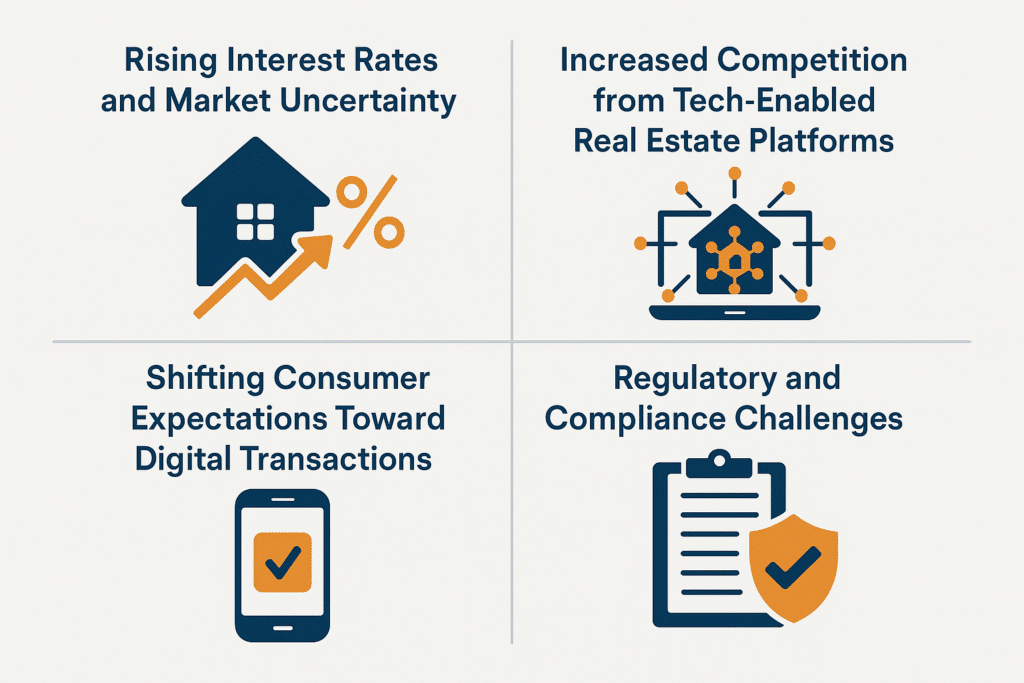If you’ve been in the industry a while, chances are you’ve seen all sorts of teams. Some of them operate like a well-oiled machine, and some of them seem more like a chaotic circus. In such a fast-paced and competitive market, there are distinct advantages to being part of a high-performing team. On the other hand, real estate team challenges can plague even successful companies, holding them back from reaching that “machine” status.

The truth is that every team is going to face its fair share of challenges. How these hurdles are handled is what sets exceptional teams apart. Keep reading to learn how our experts recommend managing some of the most common real estate team challenges.
The Biggest Real Estate Team Challenges
Teamwork makes the dream work. It’s a cliche–but one that rings true for most people. Being on a team offers tangible benefits and growth to a lot of real estate professionals. However, that doesn’t make it easy.
Communication Conundrums
Picture this: you just missed out on a hot listing because someone forgot to let you know that a seller called yesterday. Oops!
Many industries face communication barriers or challenges, but real estate is unique because of examples like this one. Things happen at a quick pace, and the small daily decisions add up to real deals. According to the National Association of Realtors, almost 90% of the time, homeowners work with the first agent that they meet. That means agents need to move rapidly, or they could lose out on opportunities. Slow (or non-existent) communication between people on a real estate team means another agent might get to a potential client before you do.
In general, you can expect communication breakdowns to lead to missed opportunities, frustration, and the infamous “I thought you were handling that!” It’s like playing a game of telephone, but the stakes are a lot higher than a simple message getting lost in translation.
Who is Doing What? (Also Known as Role Ambiguity)
Ever had that moment when you’re not sure if you should handle a client’s question or if that’s stepping on another agent’s toes? Welcome to the world of role ambiguity! When team members aren’t clear on their responsibilities, it can lead to overlap, gaps, or even a turf war. You really don’t want that kind of drama in your office. We have more suggestions below, but this is a good example of why you should have a real estate team agreement in place.
Market Fluctuations
Most sectors have seasonality or cycles, but few have the constant ups and downs that the real estate market has to deal with. The real estate market is like a rollercoaster (including feeling sick to your stomach at times). In fact, many experts point to large swings in the market since Covid, due to:
- Home prices skyrocketing
- Mortgage rates surging after falling to a record low in 2021
- Inventory is drying up in many areas
- Builders ramping up, then needing to pull back
- An increase in cash buyers in several markets
Managing just one of these factors can add work to your plate. Combining them all makes for truly interesting times! Economic downturns, housing market shifts, and changing buyer behaviors often leave teams scrambling. The key is learning how to navigate these twists and turns without losing your lunch.
Technological Integration
Let’s talk tech. In an age where apps are popping up faster than you can install them, keeping up with new tools and platforms can feel like a job in itself. While a lot of industries depend on various technologies, real estate tends to rely on several important platforms that are often evolving. You want to streamline operations and enhance client experiences, but if you can’t figure out how to log in, good luck with that!
Lead Generation and Conversion
Your real estate results will only be as good as the funnel of leads you have. Finding quality leads can feel like hunting for a needle in a haystack, but doing so is the lifeblood of many teams. And converting those leads? That’s not exactly the easy part. Without a solid strategy for sourcing and nurturing leads, you might as well be throwing your business cards into the wind and hoping for the best. For teams weighing third-party platforms as part of that strategy, understanding Zillow Flex Pricing is critical to knowing whether success-fee lead generation aligns with your long-term growth model.
Talent Retention
Keeping top-performing agents motivated is crucial, but it’s easier said than done. High turnover rates can be a real buzzkill for team morale. You want your best agents to stick around, but if they’re not feeling valued or challenged, they might just take their skills (and relationships) elsewhere. In a market where agency-hopping is common, how can you hang onto your top talent and look for team members who can add to the bottom line?
But Wait, There’s More: Team Challenges in 2025
As if all of those factors weren’t enough, the current market presents a few distinct hurdles as well. In 2025, agents are also dealing with:

- Rising Interest Rates and Market Uncertainty – As interest rates rise, buyers may think twice about jumping into the market, creating hesitation that can rattle even the most seasoned professionals.
- Increased Competition from Tech-Enabled Real Estate Platforms – The tech-savvy competition isn’t just in your backyard; it’s everywhere! With the rise of far-reaching real estate platforms, traditional models are under pressure. People can do more research independently, and agents can gain access to market insights from half a world away. Real estate teams need to up their game or get left behind.
- Shifting Consumer Expectations Toward Digital Transactions – Today’s buyers are all about convenience. If you’re not offering a seamless digital experience, expect them to swipe left. Digital platforms for paperwork review, document storage, e-signing, virtual tours, and more are becoming baseline expectations for today’s consumers.
- Regulatory and Compliance Challenges – Don’t forget ever-changing regulations in some areas. Keeping up with compliance can feel like chasing a moving target. One slip-up, and you could find yourself in hot water with hefty fines.
Proven Strategies for Overcoming Real Estate Team Challenges
If you’re feeling a bit down after reading all of that, hang in there. The good news is that there are a lot of things teams can do to avoid these troubling scenarios and manage team culture for improved performance.
Implement Clear Communication Systems
In case we haven’t made it clear by now: effective communication is absolutely crucial. Whether it’s using group chats, project management tools, or daily stand-up meetings, find the best methods that suit your team. The clearer the lines of communication, the smoother the operations. Here are a few specific tactics you might want to consider:
- Use Team Messaging Apps – Platforms for instant messaging or creating channels for specific topics (like Slack or Microsoft Teams) can help keep everyone accessible and keep conversations organized.
- Try Project Management Tools – You could also look into more ways to manage large deals and highlight deadlines and responsibilities. Trello or Asana are good examples of software that track team milestones and allow people to assign tasks, ask questions, etc.
- Leverage Video Conferencing – Not all meetings need to be in person. Make the most out of video conference tools when face-to-face isn’t an option. Another benefit is that you can record sessions so that you have important discussions documented.
- Get Email Organized – Make sure that the team is making the most of their email system. Encourage everyone to categorize emails related to specific listings or clients (or however it feels most natural for them).
- View Shared Calendars – A group calendar that helps the team keep track of important dates, open houses, key meetings, and more will help everyone to stay on the same page about scheduling. Ideally, no one can say, “I didn’t know that was happening that day.”
- Share Documents and Collaborate Effectively – Do you use a formal system for document sharing currently? If not, look into some ways to collaborate on spreadsheets, listing documents, and contracts. Relying on email for every touchpoint on a document can be cumbersome and waste time, and let tasks slip through the cracks.
- Incorporate Feedback and Check-Ins – Does the team have regular touchpoints on things like current deals, progress on projects, or the sales funnel? Getting a regular update on the books will help to foster open communication and keep the team aligned. Plus, employees will feel like they can share problems or concerns with leadership before they become bigger issues.
Define Clear Roles and Tasks
Establishing a clear structure within your team can work wonders. Create role definitions that leave little room for confusion, so everyone knows who’s responsible for what. This way, you’ll avoid those awkward “You thought I was doing that?” moments. It’s important that everyone on the team understands who is responsible for:
- Leadership – Things like setting goals and coordinating team events. This person (or group) is also likely responsible for things like scheduling training or evaluating overall agent performance.
- Listing Agent Duties – Examples include conducting property evaluations, setting listing prices, and creating marketing materials.
- Buyer’s Agent Responsibilities – Property showings and guiding clients through the process; negotiating offers and managing contracts.
- Administrative Support – Handling paperwork like contracts, managing the team’s schedules and appointments, and maintaining client databases.
- Marketing Coordination – Developing new promotional strategie,s such as managing social media accounts or creating campaigns for high-value properties.
- Lead Generation and Management – Are agents responsible for all of their own leads, or are leads assigned? Who tracks the progress?
- Compliance and Risk Management – This sometimes falls under the leadership role, but it’s important to know who is ensuring everyone complies with legal and ethical standards.
One simple way to document roles, expectations, and team structure is by using a real estate team agreement template.
Use Technology to Maximize Productivity
We can’t stress enough how important it is to embrace technology. CRM tools, automated lead management, and virtual client meetings can dramatically improve productivity. Just remember to actually use the tools once you’ve got them, and typically that means robust training to ensure user adoption. While some people are hesitant to try new platforms at first, if you can show them the ways that it’ll make their job easier, they’ll come around.
For example, Humaniz helps recruiters to cast a wider net automatically, without extra effort on their part. If you’re comparing platforms, this Courted vs Humaniz guide breaks down the differences. When searching for top talent, the software scans over 100 platforms to find ideal candidates, and then organizes a candidate pipeline to give hiring managers time back each week. Imagine gaining access to dozens of qualified candidates in the same amount of time it used to take to find one. Recruiters can also automate paperwork, track progress, and support onboarding through the platform – all of which makes their jobs a lot easier.
Provide Ongoing Development Opportunities
It’s important to come up with valuable training and professional development opportunities for your team. Not only does ongoing training and development keep your agents sharp, but it’s a tangible investment in your people. Whether it’s workshops, online courses, or mentorship programs, investing in your team’s skills will keep them competitive, motivated, and happy. They’re more likely to see a future with your firm, and you’ll reap the benefits of improved performance.
Create a Positive Culture
A culture that encourages collaboration, accountability, and support is the foundation of effective real estate team building, where successful agents will thrive. Celebrate wins, big or small, and create an environment where everyone feels valued. After all, a happy team is a productive team! You can try:
- Creating values and vision as a team, where everyone feels like their input is considered.
- Having an “open door” policy where team members feel they can share suggestions, concerns, and feedback.
- Recognizing achievements, whether individual or team, will boost morale and create a sense of belonging within the team (remember, no accomplishment is too small to celebrate).
- Sharing opportunities for growth, such as documented career paths or professional development opportunities.
- Encouraging work-life balance by setting a good example, being flexible with working hours or arrangements, and offering remote work options when they make sense.
- Focusing on inclusivity and diversity to create an environment where everyone feels respected and valued, and diverse perspectives are appreciated.
- Soliciting feedback (and then acting on it) by regularly asking team members about culture and team dynamics and seeking suggestions for improvement.
Retaining Top Talent
Have you heard the phrase “a rising tide raises all ships”? It means that successes within a certain environment benefit everyone involved. When situations are favorable, all of the individuals in the group will see positive effects.
In addition to getting the best performance out of your team, keeping top talent around helps to ensure your company has high standards that everyone will adhere to. Offer incentives, career growth opportunities, and work-life balance initiatives to keep your top performers engaged and committed. Remember, happy agents are more likely to stick with you and help you close those deals!
Real estate teams face a unique set of challenges, that’s true, but with the right strategies in place, you can turn those obstacles into opportunities.


